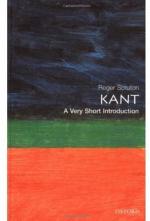|
This section contains 145 words (approx. 1 page at 400 words per page) |

|
Kant's system is intended to be a synthesis of Rationalism and Empiricism. Does he seem to favor one system over the other?
Explain the difference between categories of thought and forms of thought.
Kant claims that the cosmological and physico-theological arguments both, ultimately, collapse into the ontological argument? Is this correct?
Scruton points out the apparent contradiction involved in Kant's ethical system. Kant is philosophically committed to the idea that there can be no knowledge of the noumenal world but makes an exception for the soul. How does Kant justify this exception? Is it legitimate?
Explain how Kant derives the categorical imperative from the autonomous nature of the will.
Explain the concept of "free play." Does it successfully resolve the problem of beauty?
Kant's belief in God is based on feelings inspired by observing nature. Is this legitimate? Explain.
|
This section contains 145 words (approx. 1 page at 400 words per page) |

|



